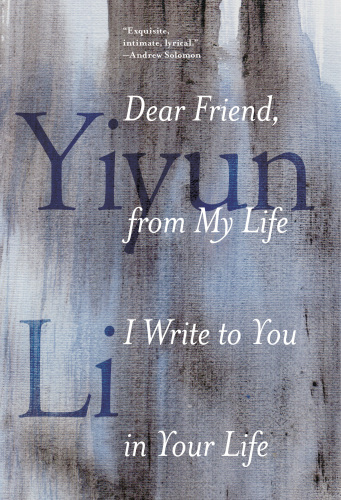
Dear Friend, from My Life I Write to You in Your Life
کتاب های مرتبط
- اطلاعات
- نقد و بررسی
- دیدگاه کاربران
نقد و بررسی

October 24, 2016
The vexed intersection between writing and living (or not living) is explored in these ruminative essays. Novelist Li (Kinder Than Solitude) explores tenuous subjects—ruptures in time, the difficulty of writing autobiographical fiction, the pleasures of melodrama—in meandering pieces that wander through personal reminiscences and literary meditations. Braided in are fragmented recollections from her youth in China, including a stint in the People’s Liberation Army; her migration to America to become an immunologist, a career she abandoned to write fiction; stays in mental hospitals; travels as a literary celebrity to meet other literati; and intricate appreciations of writers, including Thomas Hardy, Elizabeth Bowen, and William Trevor. The book can be lugubrious; Li repeatedly visits the theme of suicide—including her own morbid impulses—and is given to gray, fretful melancholia (“There is an emptiness in me.... What if I become less than nothing when I get rid of the emptiness?”). Much of the text is given over to belletristic why-we-write head scratchers such as “this tireless drive to write must have something to do with what cannot be told.” But the wispy philosophizing is redeemed by Li’s brilliance at rendering her lived experience in novelistic scenes of limpid prose and subtly moving emotion.

November 15, 2016
A Chinese-American fiction writer offers an intimate memoir of "darkest despair."In her fiction, Li (Creative Writing/Univ. of California, Davis; Kinder than Solitude, 2014, etc.), winner of multiple writing awards and a MacArthur Fellowship, has created bleak worlds inhabited by estranged, psychologically damaged characters who are haunted by their pasts. The author, who grew up in Beijing under an oppressive political regime and with an emotionally volatile, demanding mother, has resisted the idea that her work is autobiographical. "I never set out to write about melancholy and loneliness and despondency," she writes. However, as she reveals in this bravely candid memoir, those emotions have beset her throughout her life, leading to a crisis during two horrifying years when she was twice hospitalized for depression and suicide attempts. Soon after Li came to the University of Iowa "as an aspiring immunologist," she decided to give up science and enroll in the university's famed graduate writing program. She was inspired, not surprisingly, by reading William Trevor, "among the most private writers," whose stories gently evoke the lives of sad, solitary characters. Li's abrupt career change included a decision to write in English, which led some to accuse her of rejecting her Chinese heritage. Others suggested that "in taking up another language one can become someone new. But erasing does not stop with a new language, and that, my friend, is my sorrow and my selfishness." "Over the years my brain has banished Chinese," she writes, in an effort to "be orphaned" from her past. Li frequently invokes writers--Katherine Mansfield, Stefan Zweig, Philip Larkin, Marianne Moore, Hemingway, and Turgenev--who "reflected what I resent in myself: seclusion, self-deception, and above all the need--the neediness--to find shelter from one's uncertain self in other lives." Her title comes from a notebook entry by Mansfield, which Li believes expresses her own reason for writing: to bridge the distance between her life and her reader's. A potent journey of depression that effectively testifies to unbearable pain and the consolation of literature.
COPYRIGHT(2016) Kirkus Reviews, ALL RIGHTS RESERVED.

January 1, 2017
In her first nonfiction book, a work of arresting revelations, MacArthur fellow Li (Kinder Than Solitude, 2014) chronicles her struggle with suicidal depression and looks back to decisive moments in her repeatedly bifurcated life. A writer of meticulous reasoning, probing sensitivity, candor, and poise, Li parses mental states with psychological and philosophical precision in a beautifully measured and structured style born of both her scientific and literary backgrounds. As she describes her hospitalizations and precarious aftermaths, she considers other before-and-after conjunctures in her life, from her early years in China, including her time in the army, to her aspirations as an immunologist, to her arrival in America, where she dismayed everyone who knew her by deciding to become a writer instead. As she describes her mind's self-destructive tendencies, she also shares profound and provocative musings on time, memory, melodrama, language, and suicide, and portrays writers who have inspired her, including Katherine Mansfield, from whom she borrowed the book's title; Stefan Zweig; and William Trevor. This is an intelligent and affecting book of fragility and strength, silence and expression.(Reprinted with permission of Booklist, copyright 2017, American Library Association.)

September 15, 2016
A MacArthur Fellow, New Yorker 20 Under 40, and Granta Best of Young American Novelists, Li (Kinder Than Solitude) offers her first nonfiction, a meditative memoir that chronicles her move from China to America and biologist to writer, while considering the meaning of reading and writing in our lives.
Copyright 2016 Library Journal, LLC Used with permission.

























دیدگاه کاربران